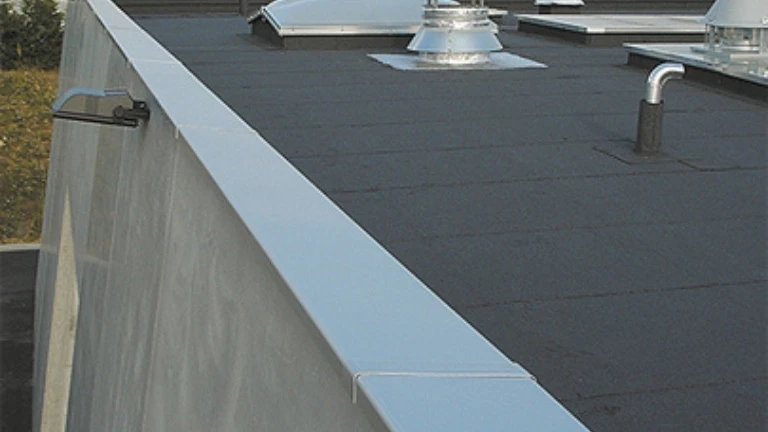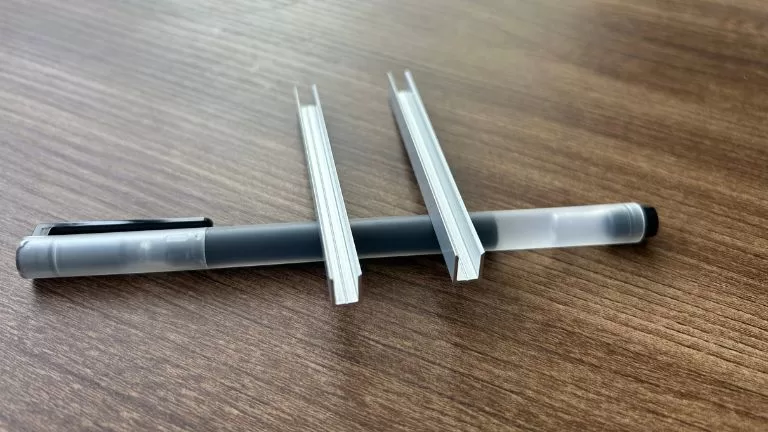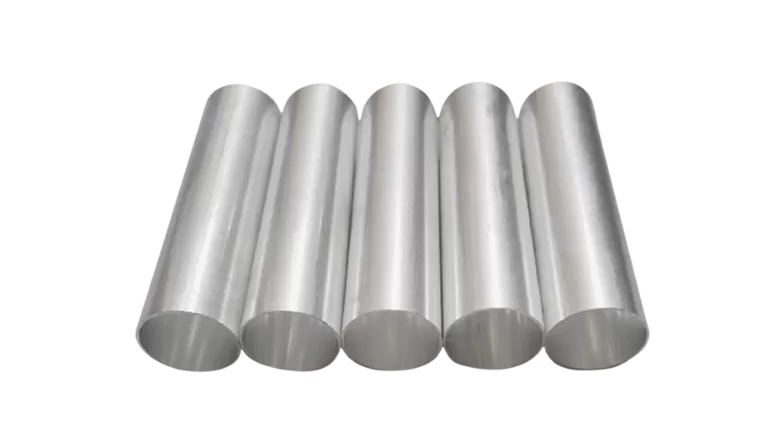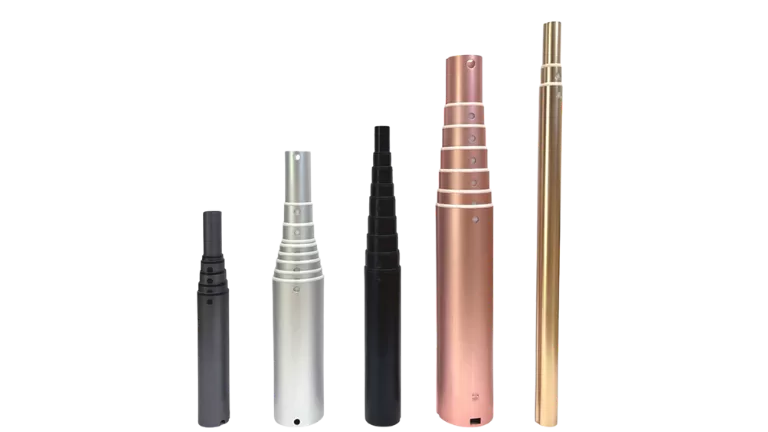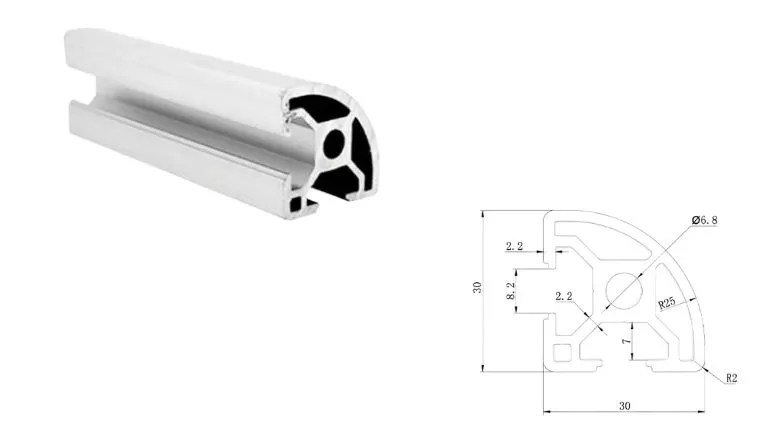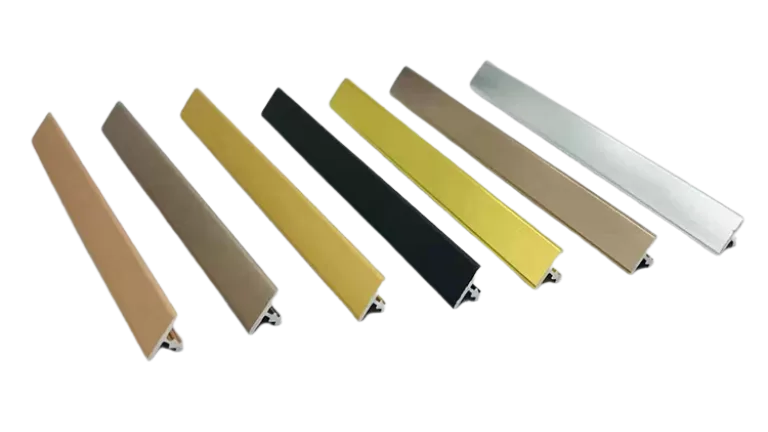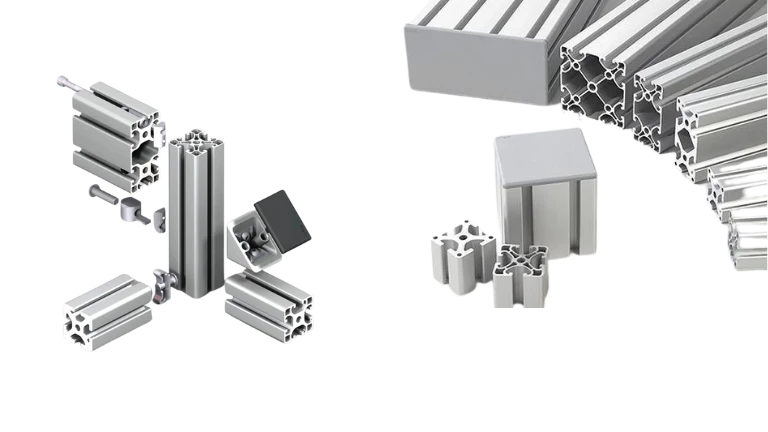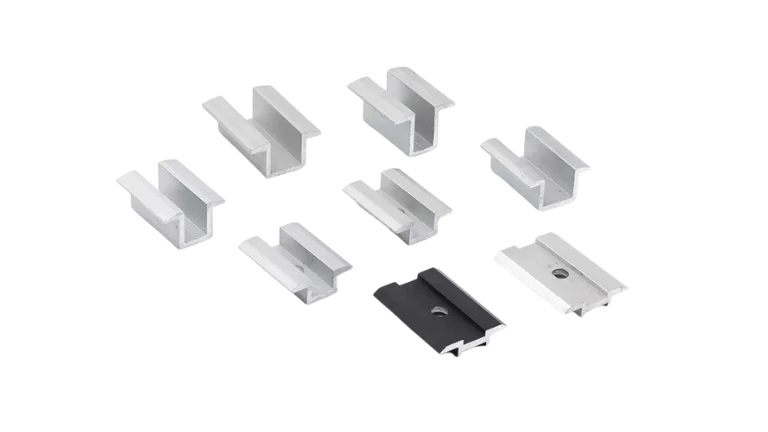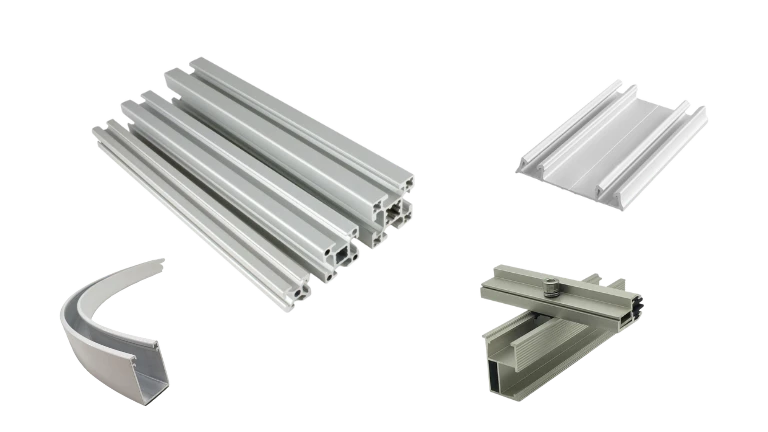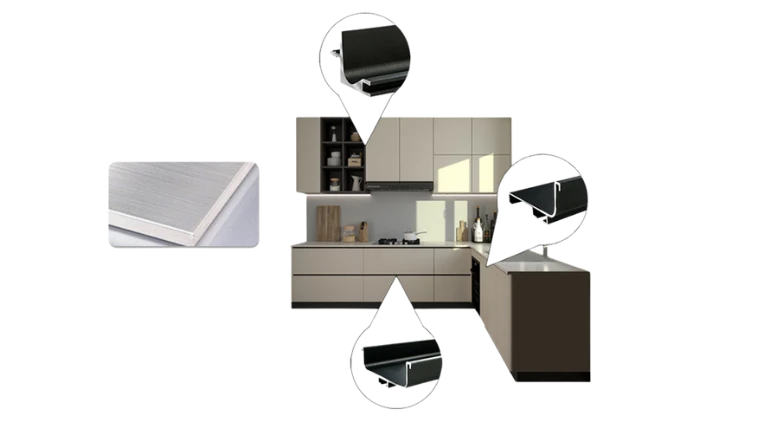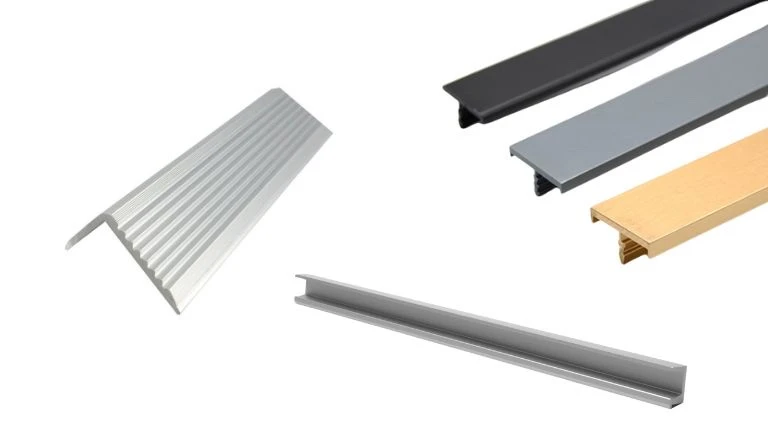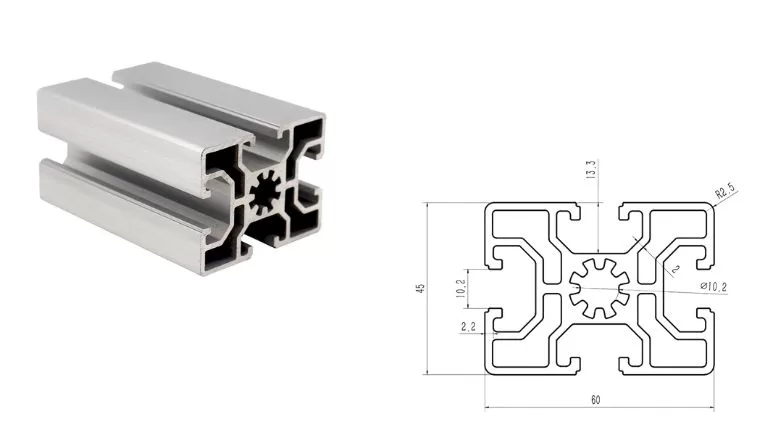Custom Aluminum Electronic Enclosure Box
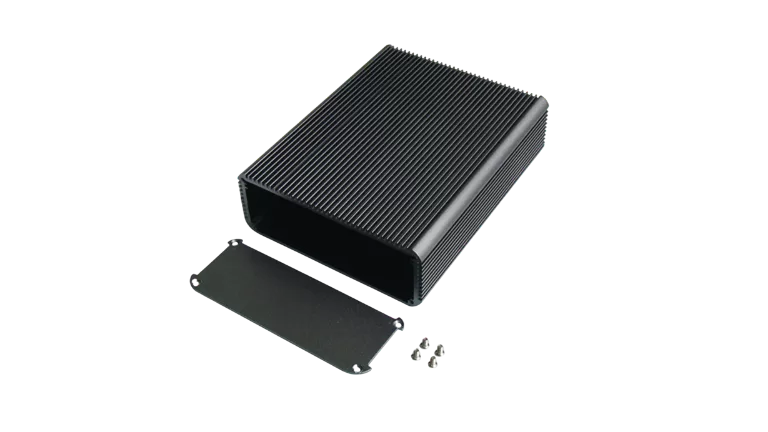
Aluminum electronic enclosure boxes protect electronic equipment from environmental factors, mechanical damage, EMI, and RFI. The main body is made using aluminum extrusion, combined with end caps and machining for precise cuts, holes, and threads to meet various needs.
These enclosures are strong, lightweight, corrosion-resistant, and ideal for securing circuit boards, controllers, and sensors in demanding environments. From compact cases to industrial-grade housings, they can be customized to exact specifications.
HTS-ALU, a leading aluminum extrusion manufacturer in China, specializes in producing these enclosures.
Benefits of Aluminum Electronic Boxes
Lightweight and Durable
Aluminum enclosures offer a perfect balance of low weight and high strength, making them suitable for portable and industrial applications.
Superior Heat Dissipation
Aluminum’s excellent thermal conductivity helps dissipate heat efficiently, ensuring the reliable performance of sensitive electronics.
Corrosion Resistance
Naturally resistant to rust and corrosion, aluminum enclosures provide long-lasting protection, even in harsh environments.
Electromagnetic Interference (EMI) Shielding
Aluminum effectively blocks electromagnetic and radio frequency interference, safeguarding electronic components from external disruptions.
Customizable Design
Easily machined and anodized, aluminum enclosures can be tailored with precise cuts, holes, and finishes to meet specific design requirements.
Eco-Friendly and Recyclable
Aluminum is 100% recyclable, making these enclosures an environmentally friendly choice while maintaining high functionality and aesthetics.
Electronic Enclosure Boxes Process
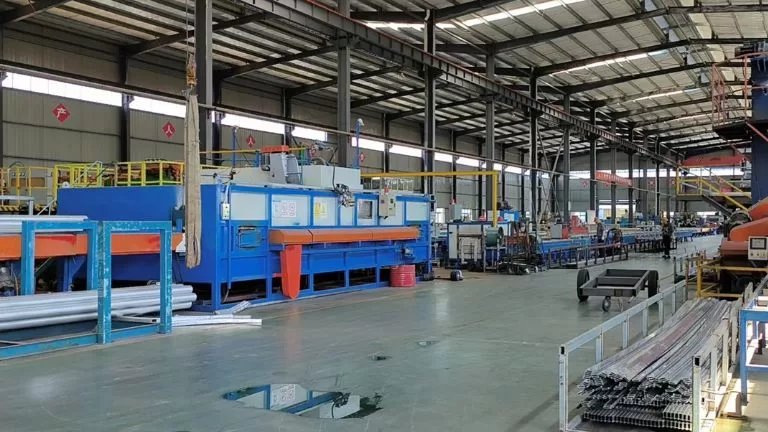
Extrusion Process
We have 40 extrusion production lines with varying tonnage capacities, specifically designed for the manufacturing of aluminum electronic enclosure boxes. These lines enable us to produce high-precision extruded profiles according to customer-provided drawings or samples. The extrusion process ensures lightweight yet sturdy structures with excellent dimensional accuracy, perfect for housing delicate electronic components. Whether simple or highly complex designs, our advanced extrusion capabilities meet the diverse requirements of modern electronic enclosures.
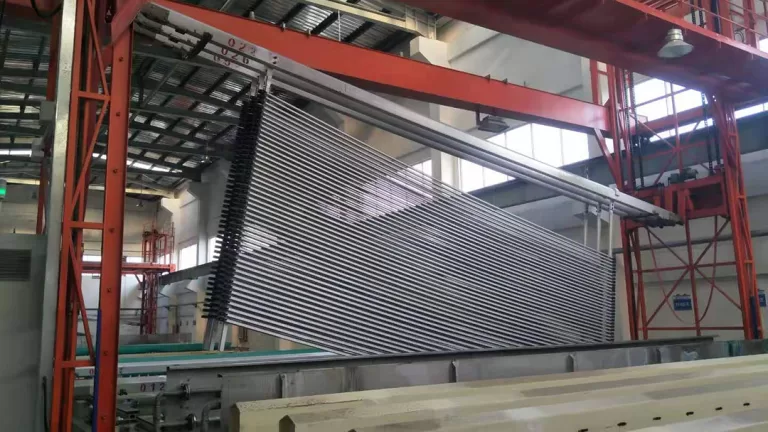
Surface Treatment
Our aluminum electronic enclosure boxes undergo a comprehensive range of surface treatments to improve both performance and appearance. We offer anodizing for enhanced corrosion resistance and a professional finish, powder coating for durable and long-lasting protection, and brushing for a refined aesthetic touch. These treatments ensure that the enclosures not only perform well in harsh environments but also display an attractive and high-quality surface that can match specific design preferences or branding needs.
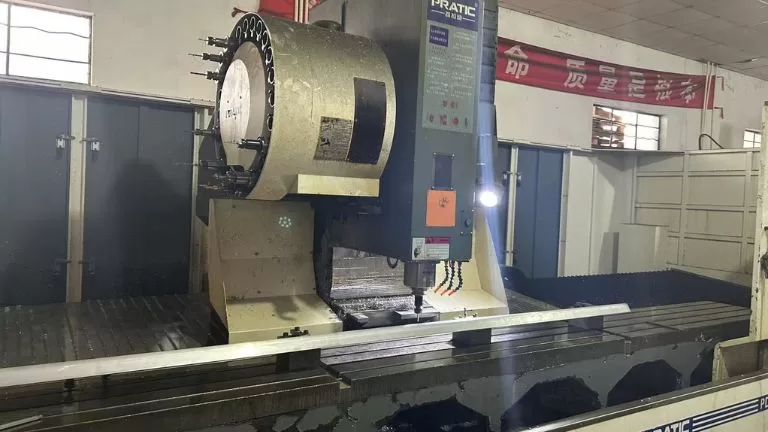
Machining and Assembly
To meet the functional requirements of electronic enclosures, we offer complete machining services, including CNC cutting, drilling, threading, and punching, to create holes and ports for connectors, switches, and other components. After machining, we proceed with precision assembly, integrating additional accessories like end caps, gaskets, locking mechanisms, and brackets to deliver fully functional and ready-to-use enclosures. Our streamlined machining and assembly processes ensure that the aluminum enclosures meet exact design specifications, making them ideal for a variety of electronic applications in industries such as telecommunications, automation, and consumer electronics.
Customization Options
We specialize in providing tailored aluminum electronic enclosure solutions based on customer requirements. With expertise in extrusion, machining, surface treatment, and assembly, our services are designed to deliver high-quality, customized products that meet the stringent demands of modern electronics industries.
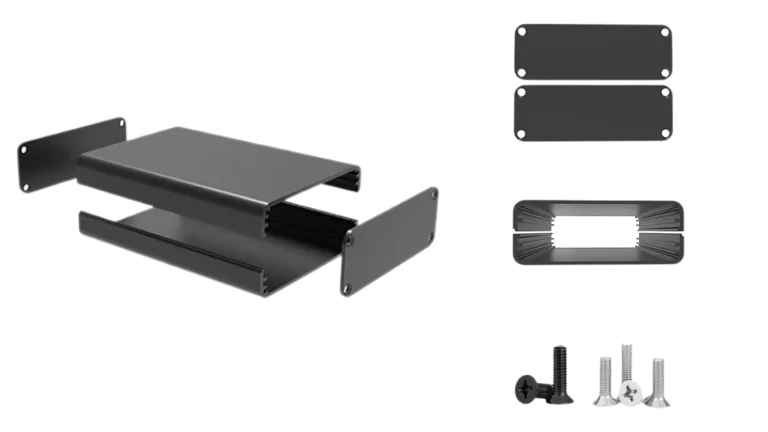
Customizable Dimensions and Sizes
Width and Height: Choose from standard sizes or fully customized dimensions to fit your internal components perfectly.
Wall Thickness: Available from 1 mm to 5 mm, tailored to your durability and application requirements.
Length: Continuous lengths or cut-to-size options based on your exact specifications.
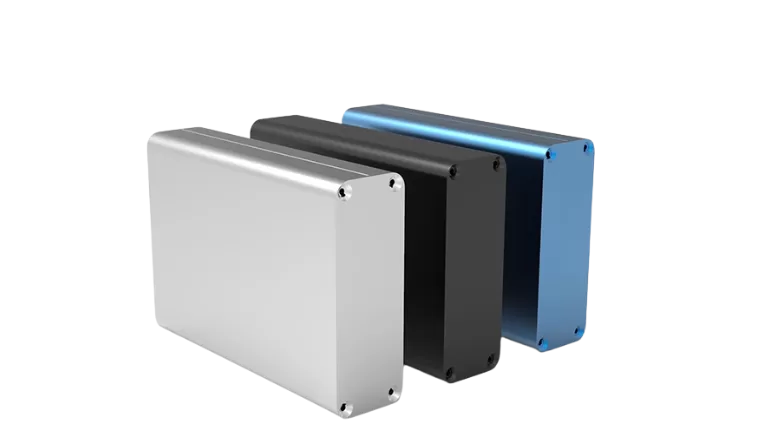
Materials and Aluminum Alloys
We offer premium aluminum alloys to meet specific mechanical, thermal, and corrosion-resistant needs:
6063 Aluminum Alloy: Ideal for precise extrusions and smooth finishes.
- Chemical Composition:
- Aluminum (Al): 97.5%-99%
- Magnesium (Mg): 0.45%-0.9%
- Silicon (Si): 0.2%-0.6%
6061 Aluminum Alloy: Stronger and highly corrosion-resistant, perfect for rugged enclosures.
- Chemical Composition:
- Aluminum (Al): 95.8%-98.6%
- Magnesium (Mg): 0.8%-1.2%
- Silicon (Si): 0.4%-0.8%
Both alloys can be heat-treated to T5 or T6 tempers for enhanced durability and load-bearing capacity.
Surface Finishing Options
Customize the appearance and durability of your enclosure with the following finishes:
Anodizing: Scratch-resistant and corrosion-resistant, available in clear, black, or custom colors.
Powder Coating: Durable, vibrant finishes for industrial or consumer applications.
Brushed or Polished Finish: Adds a refined, professional look for decorative or high-end products.
Electroplating or Chromating: Advanced corrosion resistance and excellent conductivity for electronics.
Sandblasting: Provides a uniform matte finish for premium electronic products.
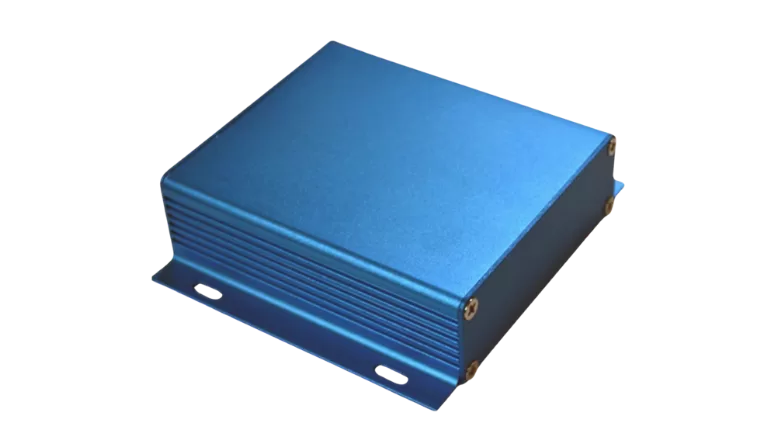
Secondary Processing and Machining
We offer flexible secondary processing to meet your functional requirements:
CNC Machining: Precision cutouts, screw holes, and mounting slots.
Drilling and Tapping: Pre-threaded holes for secure assembly.
Laser Etching or Engraving: Add logos, labels, or designs directly onto the surface.
Custom Assembly: Fit end caps, gaskets, and mounting hardware according to your design.
Manufacturing and Lead Times
Tooling and Die Creation: Custom tools developed within 7 days.
Production Time: Bulk orders (~26 tons) completed in 10–20 working days, depending on complexity.
Quality Control: Every enclosure undergoes rigorous checks for dimensional accuracy, surface quality, and structural integrity.
Why Choose HTS-ALU for Aluminum Electronic Enclosure Boxes?
HTS-ALU is a leading aluminum extrusion manufacturer in China with specialized expertise in designing and producing customized enclosures for a variety of industries.
- Certified High-Quality Aluminum: Guaranteed purity and compliance with international standards.
- Complete Customization: Tailored designs to meet your exact specifications.
- Advanced Equipment: State-of-the-art facilities for consistent quality and precision.
- Global Export: Reliable and timely delivery to customers worldwide.
If you need durable, lightweight, and customizable aluminum enclosure boxes for your electronic devices, HTS-ALU is here to help. Whether it’s compact casings, industrial enclosures, or intricate custom designs, we’ll provide tailored solutions to meet your needs. Contact us today to discuss your project, get a competitive quote, and let us safeguard your electronics with precision and quality!
Our Factory
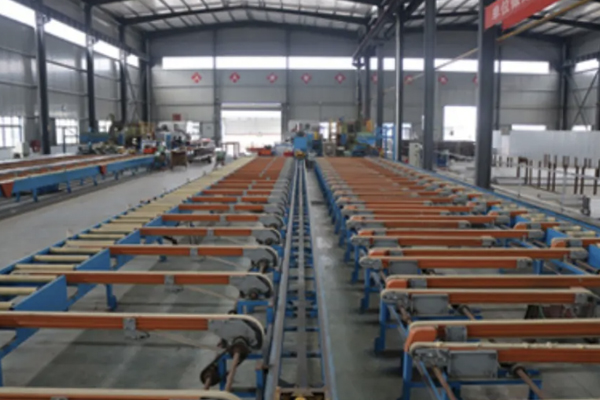
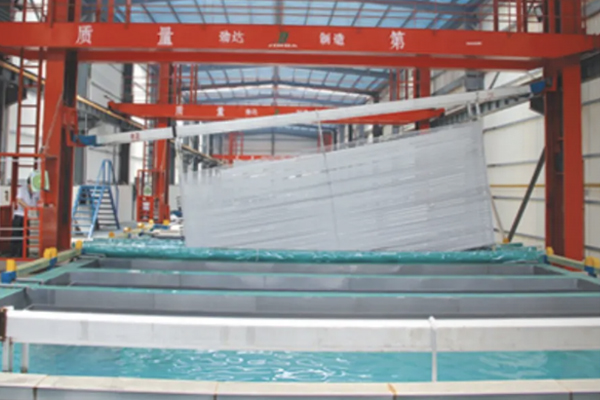
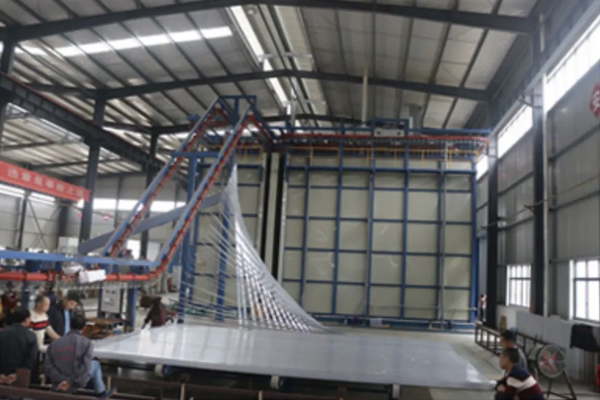
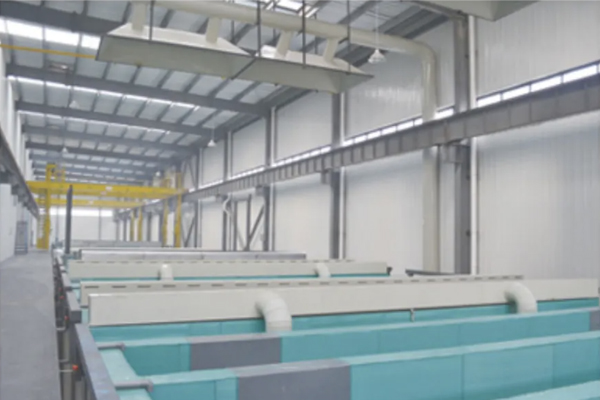
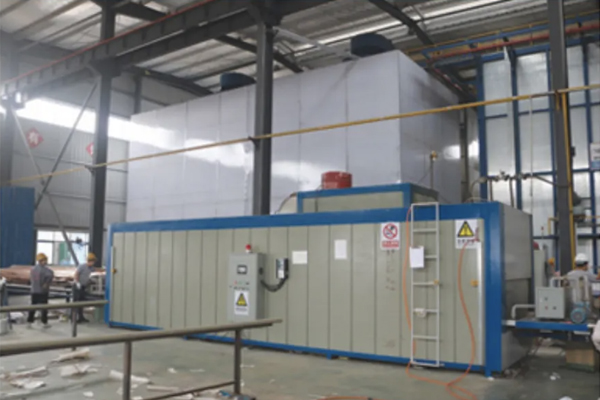
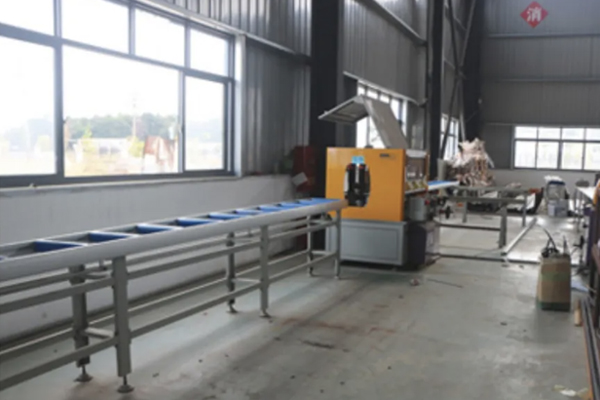
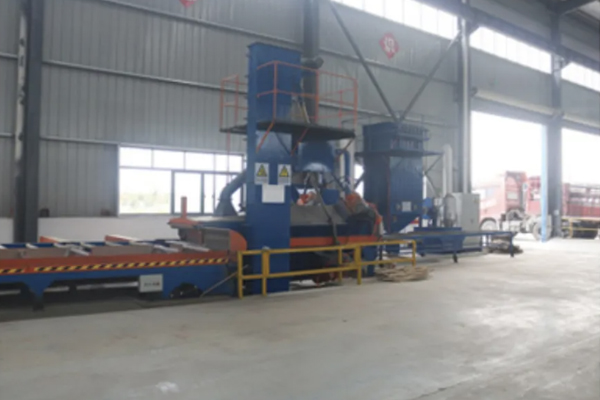
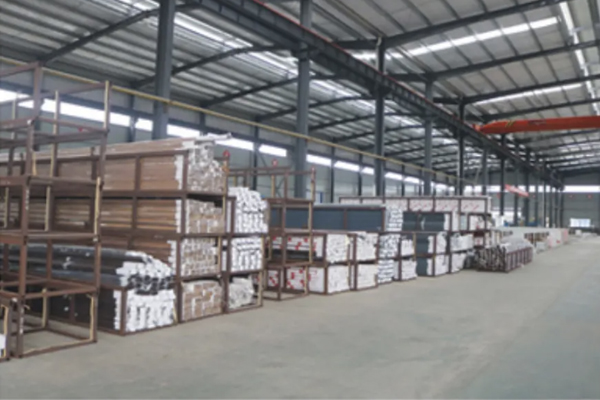
RFQ of Extruded Aluminum Profile
Industrial Automation:
- Protects controllers, drives, and data acquisition systems in manufacturing plants and warehouses.
Telecommunication Equipment:
- Houses signal processors, transmitters, and receivers for outdoor or indoor telecom networks.
Consumer Electronics:
- Ideal for audio amplifiers, power adapters, and handheld devices.
IoT Devices:
- Safeguards sensors and controllers used in smart home products or industrial IoT systems.
Medical Instruments:
- Used for housing medical imaging devices, monitoring equipment, or portable diagnostic tools.
Automotive Electronics:
- Protects electronic modules such as engine control units, sensors, and vehicle tracking systems.
Power Supply Units:
- Enclosures for battery packs, inverters, and other energy storage applications.
Defense and Aerospace:
- Ruggedized enclosures for military-grade electronics and avionics systems that must endure extreme conditions.
The primary aluminum alloys used for extrusion belong to the 6xxx series, specifically 6061, 6063, 6060,6082 and 6066. These alloys are highly favored due to their excellent extrudability, good mechanical properties, and corrosion resistance.
- 6061: A versatile alloy with higher strength, suitable for structural and transportation applications.
- 6063: Known as the “architectural alloy,” it offers excellent surface finish and is widely used for decorative and structural purposes.
- 6060: Similar to 6063 but with slightly lower strength, ideal for intricate and thin-walled profiles.
- 6066: A high-strength alloy within the 6xxx series, often used in more demanding structural applications.
- 6082: A strong alloy with better mechanical properties compared to 6061 and excellent corrosion resistance, commonly used in high-load structural applications and in marine environments.
The 7xxx series alloys, such as 7075, are used in applications requiring extremely high strength and performance, such as aerospace and high-end engineering projects. However, they have lower corrosion resistance when compared to 6xxx alloys and are therefore less commonly used for general extrusion applications.
While 1xxx, 3xxx, and 5xxx series alloys can be extruded, they are generally used infrequently for extrusion due to their lower strength or other limitations compared to 6xxx and 7xxx alloys. These series are mainly used in specialized applications. Additionally, if extrusion products from these series are requested, higher minimum order quantities (MOQ) are typically required for custom production, as their demand is relatively low.
The heat treatment of aluminum extrusions determines their mechanical properties, strength, and suitability for specific applications. Among the various heat treatment methods, T5, T6, and T66 are the most commonly used. Here’s an in-depth look:
| Heat Treatment State | Cooling Method | Strength | Key Features and Benefits | Applications |
|---|---|---|---|---|
| T5 | Air cooling (fan) | Moderate | Adequate strength, good dimensional stability, used for architectural purposes. | Windows, doors, curtain walls, building structures. |
| T6 | Water quenching (fast) | High | Higher strength and hardness, ideal for industrial and structural uses. | Automotive, aerospace, machinery, transport parts. |
| T66 | Water quenching (fast) | Very high | Optimized mechanical properties for higher strength and performance demands. | Automotive, rail transportation, high-end machinery. |
Other Heat Treatment States
- T4: Solution heat-treated and naturally aged. Used in applications requiring intermediate strength and enhanced formability.
- T7: Overaged for better stress-corrosion resistance, often used for aerospace and marine purposes.
- O (Annealed): Very soft condition suitable for extensive forming or bending requirements.
- F (As-Fabricated): No heat treatment applied, used in non-critical applications with low strength requirements.
Aluminum extrusions undergo various surface treatments to enhance aesthetics, corrosion resistance, and functionality. Here are the common surface treatment methods used in the industry:
Main Surface Treatment Methods
Anodizing (Oxidation)
- Process: A controlled electrochemical process that forms a protective oxide layer on the aluminum surface.
- Features:
- Provides a durable, corrosion-resistant, and environmentally friendly finish.
- Produces a metallic finish with a variety of natural tones (e.g., silver, black, bronze).
- Improves surface hardness and protects against scratching.
- Applications: Architectural frames, decorative profiles, heat sinks.
Electrophoresis Coating (E-Coating)
- Process: After anodizing, the aluminum is coated with paint using an electrochemical process.
- Features:
- Enhances corrosion resistance and offers a smooth, glossy finish.
- Provides more color and texture variation compared to anodizing alone.
- Applications: Furniture profiles, indoor architectural components.
Powder Coating
- Process: Electrostatic application of powder paint, followed by curing under high temperature to form a solid coating.
- Features:
- Wide variety of colors and textures.
- Excellent weather resistance and corrosion protection.
- Cost-effective and highly versatile.
- Applications: Outdoor frames, fences, railings, general industrial use.
PVDF Coating (Polyvinylidene Fluoride)
- Process: A specialized fluoropolymer coating is applied in multiple layers, commonly over a pretreated surface.
- Features:
- Exceptional weather resistance and UV stability.
- Highly durable, resistant to fading, chalking, and chemical damage.
- Ideal for long-term outdoor use.
- Applications: Curtain walls, high-performance architectural facades.
Wood Grain Transfer Printing
- Process: A heat-transfer printing process that applies a wood grain effect onto a pre-coated aluminum surface.
- Features:
- Mimics the appearance of wood while retaining aluminum’s durability.
- Lightweight and weather-resistant alternative to natural wood.
- Applications: Furniture, decorative coverings, outdoor panels.
Film Lamination
- Process: Adhesive application of a protective or decorative film onto the aluminum surface.
- Features:
- Provides a glossy, textured, or patterned finish.
- Often used for applications requiring specific textures like marble or leather effects.
- Applications: Interior decor, windows.
Pre-Treatment Processes
Prior to surface treatment, the aluminum surface can be pre-processed for specific textures or finishes:
Brushing/Polishing
- Removes surface imperfections and creates a smooth, reflective finish.
- Often used for decorative purposes.
Sanding/Grinding
- Produces a matte or satin finish by applying abrasives.
Shot Blasting/Sandblasting
- Sprays abrasives at high velocity to create a textured surface, often used before anodizing for a uniform appearance.
Stretching and Tension Leveling
- Straightens the aluminum profile and improves shape accuracy after extrusion.
Cost and Durability Comparison Table
| Treatment Method | Process Cost | Surface Durability | Weather Resistance | Applications |
|---|---|---|---|---|
| Anodizing (Oxidation) | Medium | Very Durable | High | Architectural frames, industrial parts. |
| Electrophoresis (E-Coating) | Medium-High | Durable | Medium | Furniture, indoor parts, decorative uses. |
| Powder Coating | Medium | Highly Durable | High | Outdoor frames, industrial fixtures. |
| PVDF Coating | High | Extremely Durable | Excellent | Curtain walls, high-end exteriors. |
| Wood Grain Printing | Medium | Moderate (topcoat dependent) | Medium | Decorative panels, furniture. |
| Film Lamination | Low-Medium | Moderate | Low | Indoor decorations, windows. |
| Brushing/Sandblasting (Pre-Treatment) | Low | Not Applicable (Preparation only) | N/A | Preparation for further treatment. |
. Anodizing (Oxidation)
- Common Colors:
Natural silver
Black
Champagne
Light bronze
Dark bronze
Gold
2. Electrophoresis Coating (E-Coating)
- Common Colors:
Black
Champagne
Light bronze
Dark bronze
Custom metallic colors
3. Powder Coating
- Colors:
Can match any color based on the RAL color chart.
Offers textures like matte, gloss, satin, and custom finishes.
4. PVDF Coating (Polyvinylidene Fluoride)
- Colors:
Also customizable using the RAL color chart.
High-end finishes with matte or glossy effects.
5. Wood Grain Transfer Printing
- Colors and Patterns:
Mimics various wood types (e.g., oak, walnut, teak, mahogany).
Custom patterns available based on provided samples.
6. Film Lamination
- Colors and Patterns:
Includes textures like marble, leather, and solid colors.
Custom finishes and patterns based on provided samples.
Pre-Treatment Options (Impact on Final Color)
- Brushing/Polishing: Produces smooth or reflective metallic surfaces.
- Sandblasting: Adds a rough, matte texture before the final surface treatment.
We provide a wide range of machining services for aluminum extrusions to meet specific requirements. These include cutting off/section removal, slotting, drilling holes, tapping threads, bending, and localized stamping to create deformations. For example, we can trim extruded profiles to custom lengths, mill precise grooves, create threaded holes for fasteners, bend profiles into specific shapes, or apply localized stamping to achieve custom forms or deformation.
In addition to these processes, we also offer TIG/MIG welding to join aluminum components for a solid structure. Furthermore, our services include assembly of common accessories, such as brackets, corner connectors, screws, hinges, end caps, and rubber seals, providing complete and ready-to-install profile solutions tailored to your project needs. This ensures that we can handle everything from simple cuts to highly customized fabrication and assembly, all with precision and efficiency.
For custom aluminum extrusion projects, we accept a variety of drawing formats, including CAD files, STEP files, and PDF files. However, for extrusions that require additional machining processes, it’s recommended to provide STEP files, as they ensure precise 3D modeling for machining accuracy.
While PDF files are acceptable, converting them into CAD drawings may result in the loss of certain details, requiring us to manually redraw the design, which could increase lead time. For the fastest and most accurate quotation, we recommend providing CAD files (e.g., DWG/DXF) and STEP files to ensure efficient design evaluation and pricing.
Mold fees are an essential part of the custom aluminum extrusion process. Since every order requires a uniquely designed mold tailored to specific requirements, these molds cannot be used for other products. Therefore, the mold fee is necessary and non-negotiable.
We require 100% upfront payment of the mold fee before mold development begins to ensure timely production. However, as a token of appreciation for your support, we offer a refund of the mold fee or equivalent discounts once the order reaches a certain production volume. Specific policies can be discussed based on your order volume and collaboration details.
Our minimum order quantity (MOQ) varies depending on the size of the product. For smaller-sized products, the MOQ is typically 500kg, while for larger-sized products, it is 2 tons.
We will specify the exact MOQ requirements during the quotation process. If your order quantity does not meet the MOQ, we can still arrange production, but an additional fee will be applied to cover mold preheating and production setup time. Rest assured, this extra fee will be reasonable, and we aim to keep it as minimal as possible to ensure smooth cooperation.
Packaging can be customized according to your needs. Options include using protective film or paper to separate and protect the surface, or foam film for additional surface protection. Products can be palletized or packed into cartons, and the quantity per pallet or carton can be specified by the customer.
The standard packaging involves bundling several pieces together with plastic wrap and then securing them onto pallets. Any packaging requirements beyond the standard will be accommodated, and the associated costs will be clearly provided to the customer.
Mold production typically takes 7 days. After the sample is confirmed, producing a full container load of 26 tons generally requires 14 days for extrusion alone. If surface treatment is required, an additional 3 days will be needed. For machining, extra time will be required depending on the complexity and volume of the machining work. The exact additional time for machining will be determined based on the specific processing requirements.
Aluminum profiles are naturally corrosion-resistant due to the formation of a thin, protective oxide layer when exposed to air or water. This oxide layer is stable and self-repairing, meaning that even if the surface is scratched or cut (such as at exposed ends or during processing), the aluminum will not rust or corrode like iron or steel. Instead, the exposed areas will quickly form a new oxide layer, providing continuous protection against further oxidation.
With proper design, installation, and maintenance, aluminum profiles can last for decades, even in challenging environments. For example, untreated aluminum can easily withstand 20-30 years in outdoor applications, while profiles with surface treatments like anodizing or powder coating can last even longer, often exceeding 50 years. This makes aluminum an excellent choice for applications where durability and long-term performance are essential.
The price of aluminum profiles consists of several components: raw material costs, extrusion processing fees, surface treatment fees, machining costs, and additional packaging fees. Among these, the cost of aluminum as a raw material tends to fluctuate frequently, while other fees remain relatively stable. Due to these fluctuations, our quotations are typically valid for 7 days.
Pricing can be structured in different ways depending on the product and requirements. It can be calculated by weight (e.g., cost per ton), by length (e.g., cost per meter), or by piece (e.g., cost per unit). For products involving extensive machining, such as heat sinks, pricing is generally calculated on a per-piece basis to accurately reflect the additional processing costs. This flexible pricing approach ensures the quote is tailored to the specific needs of the customer.
We can manufacture aluminum profiles in compliance with technical requirements that meet European standards (EN), American standards (ASTM/AA), or other standards as specified by the customer. Custom production is tailored to ensure that the profiles meet the specific standard requirements requested.
Our production equipment is designed for the metric system. If the drawings provided are in the imperial system, we will convert them into metric units for production to ensure accuracy.
It is important to note that while we can machine imperial-threaded holes for fasteners, if you require us to supply matching imperial fasteners, they may not always be available in stock. Custom orders for imperial fasteners typically require a large volume for production. Please consider this when planning your project.
